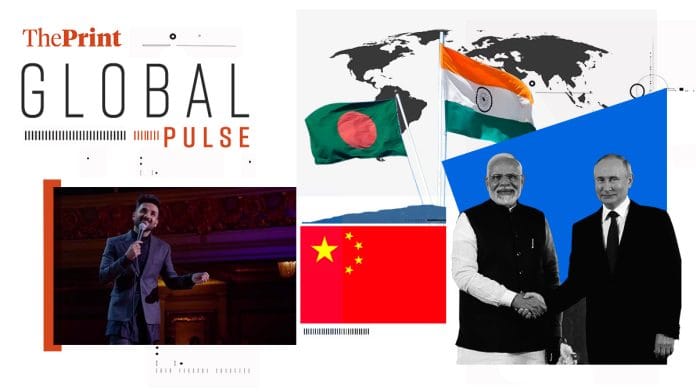New Delhi: In an article titled ‘Frozen ties’ in Dawn, Maleeha Lodhi, a former Pakistani ambassador to the US, UK and UN, writes that any prospect of “diplomatic engagement between India and Pakistan remain bleak”, citing the frequent war of words between leaders of the two countries, the latest being Prime Minister Narendra Modi’s remarks on the anniversary of the Kargil conflict.
“It seems the Modi government’s preference is to maintain a strategic freeze on relations with Pakistan. It has shown no interest in resuming dialogue with Islamabad, apparently concluding that this hurts Pakistan, not India,” she writes, further criticising Indian media for connecting the terror attacks in Jammu and Kashmir to Pakistan. She calls it “an orchestrated effort to externalise the problem in order to shield the government from blame for the deteriorating security situation”.
Another point she raises is that of Kashmir, stating “India’s obdurate refusal to discuss the Kashmir dispute poses a major challenge for Pakistan”.
“The China-India relationship is a delicate dance of cooperation and competition,” an editorial in the Global Times reads, listing the positive developments, such as S. Jaishankar and Wang Yi’s meeting on the sidelines of ASEAN Foreign Ministers’ Meeting in Laos, where they discussed to “resolve the border disputes” and the possibility of India speeding up visas for Chinese technicians. These “reflect that both sides have realized the urgency of further improving mutual trust”, the piece titled ‘China and India: A meeting of national positioning or a clash of interests?’ argues.
Citing the vast amounts of trade between the two countries and the power of their combined population, the article suggests the need to build trust by establishing clear channels of communication amid the ongoing border dispute. It further suggests building people-to-people ties and that the countries work together on global issues like climate change and counter-terrorism.
Dr Chietigj Bajpaee, senior research fellow for South Asia at Chatham House, writes in The Diplomat about Modi’s maiden bilateral visit to Russia after taking oath as PM for the third time. Bajpaee calls it “a far cry from Modi’s initial commitment to the neighborhood when he assumed power in 2014 by inviting the leaders of all South Asian countries to his inauguration and his government announcing a “Neighborhood First” policy”, claiming that India’s regional role “is being eclipsed” and its presence in South Asia has “fallen off the radar.”
The article, titled ‘Can India Rise Without South Asia?’, argues for why engagement in the neighbourhood matters for India. The author speaks of China’s rise in the region, its influence over nations and how the country “regionalised before it globalised”, claiming that developments in the neighbourhood and the political and social instability is significant for India.
In Foreign Policy’s ‘Modi’s Long Game’, Salil Tripathi traces the PM’s life and career as he reviews books on him. He mentions Christophe Jaffrelot’s new book Gujarat Under Modi: Laboratory of Today’s India, The Incarcerations by Alpa Shah, Savarkar and the Making of Hindutva by Janaki Bakhle, Twilight Prisoners: The Rise of the Hindu Right and the Fall of India by Siddhartha Deb, How Long Can the Moon Be Caged? Voices of Indian Political Prisoners by Suchitra Vijayan and Francesca Recchia.
Through these, Tripathi compiles the list of allegations against Modi — silencing dissent, and the 2002 Gujarat riots, among others — and explores the future of a “although wounded but still vastly popular” leader.
A report in Nikkei Asia tries to assess the Indian comedy industry. Charukesi Ramadurai in an article titled ‘In India, comedy is no longer a funny business’, quotes comedians who talk about “self-censoring”, death threats, and court cases against something they’ve joked about in shows.
Claiming that this is done to “tightly control the narrative and shape the messaging that goes out to these young people” by the “government, some comedians in India face an added layer of vulnerability, as members of the minority Muslim community” or as “women”.
Referring to incidents against Vir Das, Agrima Joshua, Munawar Faruqui, and Nalin Yadav, among others, Ramadurai claims that despite the constitutional guarantee of freedom of speech and expression “the law provides little protection against harassment of dissenting voices — comedians or otherwise — who are often persecuted under legislation purportedly entrenching communal and religious harmony.”
Also read: From stock market & foreign investment to sports, global media compares India to China
Israel-Hezbollah tensions escalate & US raises concerns over Venezuelan elections
The possibility of a full-scale war in Lebanon looms as tensions between Israel and Hezbollah escalate. To know more about the situation and the events leading up to it, read BBC’s coverage.
Nicolas Maduro wins third term as President of Venezuela. However, confusion exists as the opposition, too, claims victory. Amid this, the US Secretary of State. To know more, read CNN’s report.
Also read: Biden’s withdrawal rare but not unprecedented. Seven other US presidents have dropped out before






